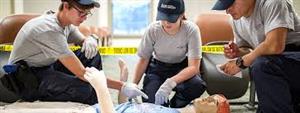Criminal Justice
Page Navigation
- Erie High School
- Overview
-
Criminal Justice


CIP Code: 43.0107
Pathway: Human Services
Instructor: Jason Fink
Certifications: CPR/First Aid/AED, MDTS, MOAB, OCAT, PATH, PPBT, EMT, NIMS 100, NIMS 200, NIMS 700, NIMS 800
Introduction - Program of Study
Police officers protect lives and property. Detectives and criminal investigators, who sometimes are called agents or special agents, gather facts and collect evidence of possible crimes. Law enforcement officers' duties depend on the size and type of their organizations. Correctional officers are responsible for overseeing individuals who have been arrested and are awaiting trial or who have been sentenced to serve time in a jail, reformatory or prison.
Uniformed police officers typically enforce laws, respond to calls for service, patrol assigned areas, conduct traffic stops and issue citations, arrest suspects, write detailed reports and complete forms, prepare cases, and testify in court. Police officers pursue and apprehend people who break the law and subsequently warn, cite, or arrest them. Police officers patrol their jurisdictions and investigate any suspicious activity they notice. They also respond to calls, issue traffic tickets, investigate domestic issues and give first aid to accident victims.
The daily activities of police and detectives vary with their occupational specialty and whether they are working for a local, state, or federal agency. Duties also differ among federal agencies, which enforce different aspects of the law. Regardless of job duties or location, police officers and detectives at all levels must write reports and keep detailed records that will be needed if they testify in court.
Correctional officers typically enforce rules and keep order within jails or prisons; supervise activities of inmates; aid in rehabilitation and counseling of offenders; maintain security by preventing any disturbances, assaults, or escapes; inspect inmates and conditions within facilities to ensure that they meet established standards; enforce discipline; search inmates for contraband items; and, report on inmate conduct. Correctional officers may have to restrain inmates in handcuffs and leg irons to escort them safely to and from cells and other areas; and to visit with authorized visitors. Police and security officers enforce regulations through effective communication and the use of progressive sanctions, which may involve punishments, including the loss of privileges. In addition, officers may aid inmates in their rehabilitation by scheduling work assignments, counseling, and educational opportunities. They write reports or complete daily logs detailing inmate behavior and anything of note that occurred during their shift.
Security officers or bailiffs also escort prisoners between the institution and courtrooms, medical facilities, and other destinations. Immigration and customs inspectors investigate and inspect persons or merchandise, arriving in or departing from the United States, in order to detect violations of immigration and customs laws and regulations.
Assumptions of this Program of Study
High quality programs should meet the following standards:
1. Promote positive working relationships.
2. Implement a curriculum that fosters all areas of skill development
3. Use appropriate and effective teaching approaches.
4. Provide ongoing assessments of student progress.
5. Employ and support qualified teaching staff.
6. Establish and maintain relationships and use resources of the community.
7. Provide a safe and healthy learning environment.
8. Implement strong program organization and supervision policies that result in high quality teaching and learning.
9. Integrate academic skills and aptitudes necessary for postsecondary education, gainful employment and a foundation of lifelong learning.
CIP Code 43.0107 Criminal Justice/Police Science
A program that prepares individuals to perform the duties of police and public security officers, including patrol and investigative activities, traffic control, crowd control and public relations, witness interviewing, evidence collection and management, basic crime prevention methods, weapon and equipment operation and maintenance, report preparation and other routine law enforcement responsibilities.

